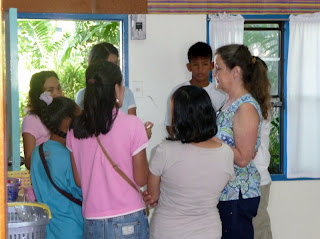You can get a feel for our neighborhood by joining us for a look
at some of the photos we took along the way...
 A sari-sari, or neighborhood shop where you can buy small portions of candy, cleaning products, etc.
A sari-sari, or neighborhood shop where you can buy small portions of candy, cleaning products, etc. A sari-sari, or neighborhood shop where you can buy small portions of candy, cleaning products, etc.
A sari-sari, or neighborhood shop where you can buy small portions of candy, cleaning products, etc.
 Children had lined up outside the gate as early as 5 a.m.
Children had lined up outside the gate as early as 5 a.m. Many at the front of the line were familiar faces of children who come to our home asking for work!
Many at the front of the line were familiar faces of children who come to our home asking for work! Our co-worker, Barbara A. (on the right) had returned from her new assignment in the U.S. to coordinate and administer the VBS, along with many Christians from a local church which will host the event.
Our co-worker, Barbara A. (on the right) had returned from her new assignment in the U.S. to coordinate and administer the VBS, along with many Christians from a local church which will host the event. The girls and I helped to take photos of each child as part of the registration process.
The girls and I helped to take photos of each child as part of the registration process. ...were fitted for a t-shirt size, and given a packet of Bible verses to learn before coming to the VBS.
...were fitted for a t-shirt size, and given a packet of Bible verses to learn before coming to the VBS.Before we left the U.S., upon our arrival in the Philippines, and over the course of the past 9 months, we've gone through various stages of CLI, a Cross-Cultural Living Internship, in order to learn how to live more effectively in a culture that's not our own.
“Many people mistakenly believe that when they have finally mastered a language,
they have also learned
The tragedy is that because they operate with this misconception,
they never learn… the silent language of culture.”
(Lingenfelter, 2003)
Recently we took a week's course with various other co-workers who are new to this culture, and the time spent in hearing from Filipinos and other Westerners who have lived here for many years was especially valuable. The following glimpse into the Filipino culture is just one of those important insights we need in living here...
“The Filipino ‘yes’ puzzles most Westerners. A ‘yes’ could mean just that; but it could also very well mean, ‘maybe’, or ‘I don’t know’ or ‘if you say so’, or ‘if it will please you’, or
‘I hope I have said it unenthusiastically enough for you to understand I mean ‘no’.
In his desire to please he cannot bring himself to say ‘no’ openly.
This is why an invitation to dinner has to be pursued and reconfirmed several times,
otherwise a casual ‘yes’ is not deemed binding; the invitation could have been extended as a matter of courtesy;
or the person invited and accepting just could not find the proper way to say no,
so he says ‘yes’ to stall, hoping to find the right excuse when the invitation is extended a second time,
hopefully through a third person to whom he can say no without qualms.”
(Roces, 2006)
Michael actually learned in his Filipino Culture class last week that a Filipino "Maybe" is actually a very polite but definite "No."
 Here's Michael's.
Here's Michael's.

Wednesday evening, Barbara's sister Shirley went to be with her Jesus,
and woke up in Glory.
"But as for me, I will behold Your face in righteousness,
I will be satisfied with Your likeness when I awake."
Psalm 17:15
"On either hand we behold a birth, of which, as of the moon, we see but half. To the region where he goes, the man enters newly born. We forget that it is a birth and call it death. The body he leaves behind is but the placenta by which he drew his nourishment from his mother Earth. And as the childbed is watched on earth with anxious expectancy, so the couch of the dying, as we call it, may be surrounded by the birth-watchers of the other world, waiting like anxious servants to open the door to which this world is but the windblown porch."